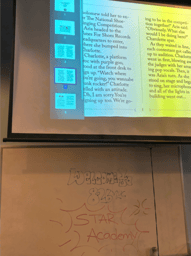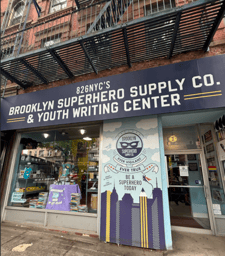For the third week of my LiA with 826NYC in Brooklyn, I worked with an older age group of students. Up until now, I had only been assisting and eventually partially leading storytelling workshops with students that were in early middle school, and the content would most of the times be similar. To an extent, I'd grown comfortable with the inquiry level that these students were at in terms of their thought process, and so the people of 826NYC suggested working with an older group to get a broader reflection of my service work.
I mainly assisted with poetry writing for this group. Most students start to understand and write poetry during the ages of 8 onwards, and 826NYC had some poignant prompts that they provided them. There was room to be both imaginative and deep, or either. It was during these introductory poetry sessions - called "Write Together After School" that I began to truly understand how cultural contexts shape students' preliminary identities, and educational approaches.
I saw this more prominently in the students I worked with in New York. Back home in Dubai, when expressing myself through poetry, I always exhibited a cautious level of restraint - most of it self-imposed, some of it due to a particular environment. It took me a while to grow into the idea of being vulnerable through poetry and expressive mediums. During high school, I also volunteered to help students write poetry in a similar manner, and I felt this sense of restraint in their work as well. We all were a little hesitant about expressing ourselves and who we really were.
However, the young students I worked with in 826NYC were raw, unafraid and even emboldened by their words. Their identity, each part of it, shone very brightly and honestly in their work. They were deep and reflective, and it truly surprised me in a very pleasant way. I remember reading the final work of a girl wrote this very unique piece about using puzzle pieces to figure out who she is, as a person - her worries, her joys, her strengths and weaknesses each constituting a singular piece. I helped her with certain words while she was writing in the process, but her final piece was something that felt so universal - I felt myself thinking about some of the questions she unearthed through her work. An excerpt from what she wrote:
"I understand almost everyone once I know them,
I say words of reassurance to friends,
I dream for the day I am fully confident in who I am,
I try to put together pieces that don't fit together,
I hope the puzzle will be finished someday,
I am [name redacted]."
It really struck me that an 11 year old could have this level of reflection. I was going through a huge transition in life myself while heading into senior year, and I began to wonder how different our questions and desires from when we're at this formative age of ten or eleven really are from our adult years. They take on different forms and angles, but at the root, they're the same. Moments like this, working at 826NYC, and understanding people of that age allow you to revisit your own experiences in a way, which I found beautiful and meaningful. How much had the cultural sense of restraint I felt at eleven affected my evolution and identity throughout my school years, and even today? One of the biggest things I'm grateful for during my three years at Barnard, Columbia, and New York City is the sense of self and confidence it gave me. I argue it wouldn't have been possible to organically feel unless I had made the radical move of packing my bags up at eighteen and leaving home. I came out of these "Write Together" sessions with teenagers invigorated with both energy and a perspective I never expected. It was a great week.


Please sign in
If you are a registered user on Laidlaw Scholars Network, please sign in